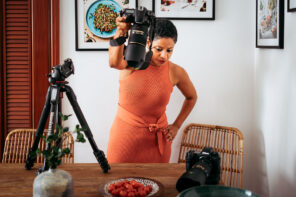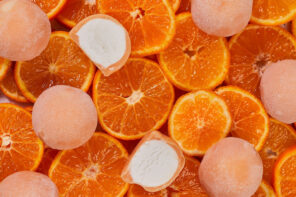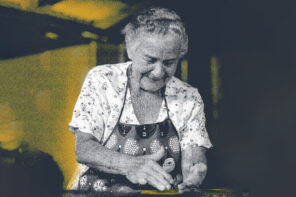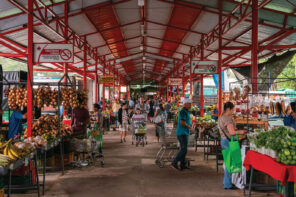Chef Joel Gamoran on making the most of all your ingredients
Joel Gamoran cooks scrappy, and we’ll get to trying to define what that means in a minute, but he does more things scrappy. During his time sheltering in place at home in Seattle the chef and host of three different TV shows, including A&E’s “Scraps,” turned his garage into a kitchen and digital studio to keep reaching people when they might need his tips and techniques most and on Earth Day launched his own channel and newsletter at @brownbanana. “We’re making the most of it,” he said to Whalebone of his time at home. And yes, we should all be so lucky as Joel’s family to be quarantined with a professional chef who’s literally written the book on cooking and making the most out of every ingredient and any situation.
In the last few weeks we’ve all been faced with a night of looking at the pantry or the cupboard and wondered what we could make of it.
Joel is here to help, and was kind enough to put down the vegetable peeler for a few minutes to answer a few of our questions about smoking banana peels and what to do with stale bread, old onion skins, shrimp shells, the tops of carrots and fish bones.

Joel at home in Seattle.
How did you get started thinking about sustainability in the kitchen?
Joel: I was going to cooking school [at the Culinary Institute of America] in St. Helena, needed a job while I was in culinary school. I thought, “You know what would be a good idea is before I go work in restaurants in San Francisco, I should network with some farmers and start getting to know my suppliers.” So I called up the Ferry Building Farmer’s Market. I said, “Do you have anyone that’s looking for someone to help sell apples or lettuce or whatever you got?” They said, “Not really. We have no one, no fruit vendors, no vegetable vendors looking for anyone, but we do have these two hippies who smoke salmon that are looking to make sandwiches out of their smoked salmon.” I’m Jewish, and I fucking hate smoked salmon. But I told them, “Whatever, sure. I’m in.”
Fast forward two years later, and this woman who runs this salmon stand kind of became my mentor even when I was in culinary school at CIA. During the week, I would be learning knife skills and classic French sauces. Then on the weekend, I’d be learning about what real life is like, and what it’s like to run a small business, and what she did. She’s the best chef I’ve ever known. Her name is Sally. She really just took all the ingredients at the Farmer’s Market, whatever she could find. Right there, she would quick pickle under-ripe peaches or she would roast peppers on an open flame in the back of our farmer’s market tent. I just learned around simplicity and, man, if you really, really let the ingredients shine and don’t get in the way of it, really, that’s cooking. That’s what it’s all about. That was kind of the foundation of sustainability for me.
The Ferry Building has been ground zero for that kind of stuff.
Joel: Yeah, yeah. It was awesome. It was awesome. I thank god because I think a lot of people who get out of culinary school, they want to kind of make their mark in food and maybe do something. Be really loud and maybe do something different. I had this counterbalanced thing where it’s just like, “No. Just highlight what’s beautiful, and let the farmers show, and show a lot of respect to them.” So that was a really, really pivotal moment for the way that I started to look at food because I did not grow up in a family with gardens and chickens. I grew up in a totally just normal American family who threw away a ton of shit, ate a bunch of canned and frozen food, and just didn’t know different.
So you are teaching people now more the principles you learned at the market than the technique you learned in culinary school?
Joel: Yeah, absolutely, absolutely. I think that it was a really actually tough time for me right out of culinary school when I moved down to San Francisco and worked in a lot of restaurants, because I hated restaurant life. I was missing something. It was funny because I really looked forward to my farmer’s market shifts. I’d be on the line working for chefs screaming at me during the week. Then on the weekend, I was looking forward to these farmer’s market shifts. So there was something to being around people, right? Because when you’re on the line, and you’re in the back of a restaurant, you’re not really interacting with people.
What I realized was although I was also cooking at the farmer’s market, the only differentiator was there were people that I could talk to. So that’s kind of what started me on this trajectory of I needed to be in front of people and inspiring people. That fueled me. The restaurant, just creating good food, was not enough.
Those are what I like to call gateway scraps.
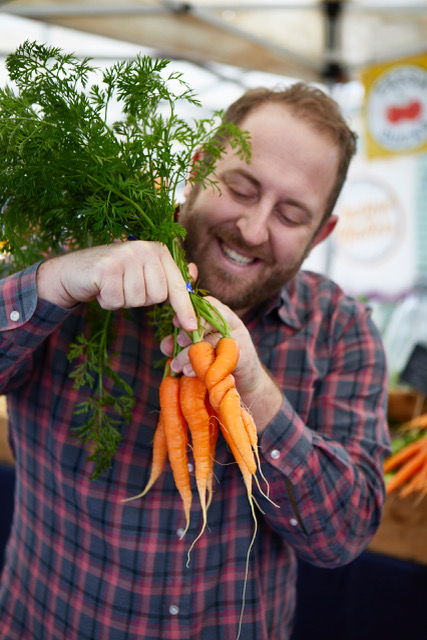
Keep the tops.
What’s the thing people most commonly waste in the kitchen that they could be getting a lot of use out of?
Joel: I would say the most common thing people are wasting is probably vegetable scraps. Things like onion peels, carrot peels, tops of carrots, beet greens, things like that. Those are what I like to call gateway scraps. They’re things that are just super… We all understand what those are. We all get it, and just we just never really looked at it before. I think what’s interesting about scraps is, and kind of the philosophy of food waste, is I didn’t create this. This is not a new way of looking at food. This is the way we were taught to look at food at culinary school. We’re taught as a chef to use everything. I realized in teaching people that we forgot that.
Let’s actually just use the ingredients they already have, whether it’s corn cobs, whether it’s chicken, whatever it is. And let’s just help them look at those things a little bit differently. How do I make chicken bones sexy? When you cut the corn off a cob, how do you make that cob amazing? What do you do with that naked cob, and how does that enhance your cooking? That’s kind of what became my calling.
I had this kind of moment. I was teaching a class in New York. This is when I was the head chef for Sur La Table, so I was traveling the country, but I was in a really, really specific class in New York. I had about 15 home cooks around me. I just looked in their bowls, in their little garbage bowls. There were shrimp shells, and there were cucumber peels, and there were all these things. I literally just thought to myself, “My chef would fucking kill me. Literally, everyone who put any effort into my education as a chef would think that I’m a failure because I’m not taking advantage of these ingredients.” That was kind of the moment where I was like, “Okay, this makes sense to restaurant chefs, but how does this make sense to home cooks? How do we get them to care about it?”
That’s when I started really thinking about it. That’s where the question came, how do we make scraps sexy? How do I inspire American home cooks, not chefs, home cooks? How do I inspire them to look at this differently?
Totally makes total sense that thinking comes out of restaurants and the way restaurants work because you when you run a business it’s like if you’re throwing things away that you could be serving to people as food, you’re throwing money away.
Joel: You also save money at home. We’re wasting about $1,500 each in food waste a year. That’s a ton of money and especially with the problem widened when I realized, okay, 40% of the food that’s produced in America, we’re throwing away. That’s almost half of all the food just being thrown away. Then I realized one out of eight people in America go to bed hungry. They don’t know where the next food is. So it just seemed fucking crazy to me. We’re throwing away half our food, millions of… billions of dollars down the drain, and there’s people who can’t even get it. So that felt like a huge disconnect.
Food Network, Discovery, Travel Channel, everyone thought it was the dumbest idea of all time.
So hoe did you first pitch a “Scraps” TV show?
Joel: It took me about three years, two and a half years to sell a show about cooking garbage. Food Network, Discovery, Travel Channel, everyone thought it was the dumbest idea of all time.
It’s crazy. They thought of me as a dumpster diver. You know what I mean? That’s what they thought, that I was going to tell people to literally reach into their trash cans, and it just grossed them out. The title that I came to them with was “Scraps.” They tested it on audiences. Audiences hated it. It sounded lowbrow. It sounded like “what is this? Is this a knitting show? Is this a garbage show? What is this?” And so very hard to sell.
At the time, I was going a lot on Today Show, Good Morning America, a lot of… and I’M still on morning shows. I became friends with Katie Couric, and she really believed in me as a young chef and how I might be able to resonate to audiences. She got behind “Scraps.” She put her name on it as an executive producer, and that’s how it got pushed over the edge and A&E ended up buying it.
It’s a very American attitude, maybe, to have that attitude that scraps are garbage, that maybe European kitchens are more accustomed to it?
Joel: No, you’re 100% right. Out of all the countries in the world, we waste the most food. Not even close. The second is UK. So very similar, right? But then you think about all the other cultures and it’s not just European. It’s Asian cultures, African… It doesn’t matter. They use everything, right? I just watched this documentary the other day where there was these fishermen curing fish on the beach with salt. What they would do is take the fish filets off once they’re cured, and leave the bones and the skin in the salt to dry in the sun, and pound that into the salt. So the salt continuously gets this fishy flavor. It just becomes this crazy, kind of alive salt that’s forever living. That’s just normal. That’s just how it’s been.
If you think some of our favorite dishes in the world, right? Those are peasant food, right? If you think about bread salad, panzanella, that’s made out of stale bread. Even just pasta al pomodoro—I studied in Italy, too—So a lot of these dishes that we just think of as kind of super exuberant, amazing dishes, they were born out of using scraps and using what you had.
When you talk about peasant food, you’re talking about just stretching the meal and why most cultures, outside of America, will have so little major protein on the plate but kind of mixed into the other things that were more available.
Joel: Totally, totally. Most cultures… Meat is a great example…where it should be a condiment. It should be a complement to a dish, not the dish. That’s a huge tweak that we got to make, yeah, as a society. It’s really tough though. This is imprinted in our brains. It’s kind of like wasting is just very normal for us, right?
Other cultures don’t even have expiration dates on things like eggs, and milk, and things like that. They just use it, and they know when it’s up, and when it’s up, there’s a use for it then. Sour milk, that’s also known as crème fraîche, right? You have eggs that are expired and actually smell funky, they put them in the garden, right? You have yogurt that’s expired, you can actually make more yogurt out of it because the cultures in those yogurts are so alive and so rich. They all know how to do that. They’re not scared of things the way that we are here. They didn’t lose that skill.
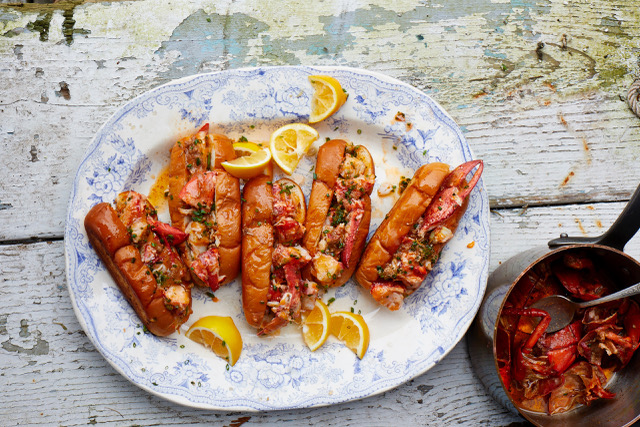
Don’t forget to save the shells.
What do you think will be some of the lasting effect of dealing with the effect of quarantining on how people approach the kitchen?
Joel: It’s really interesting time right now specifically with COVID because, in 1917, there was a huge food waste campaign in America with World War I. There’s all these old posters about inspiring Americans to save food and treat them with respect. They’re so relevant to today. And so I do hope that a little bit of what’s happening now is a wake-up call for us. I’ve never had more people reach out to me wanting to work me ever. Business has never been as good as it is now because we’re realizing that being scrappy is actually the way to be because the world is still super volatile.
I think it’s going to be two things. One, I think 100%, more people are going to cook. In a world of social media, people love watching cooking, same with Food Network. We love watching cooking, but we don’t love actually cooking. I have lots of friends who work for those meal kit services, and they have so much data about how they would send out these meal kits, and even the way they have it portioned and everything, it’s too much cooking for people. It’s too much. And so they’d rather have the garlic already chopped instead of them having to chop the garlic, like that type of thing. That’s going to change. That’s going to change. There’s the next generation, people in their 20s and 30s. We don’t have a problem spending a little bit of time in the kitchen and knowing where our food comes from.
That goes to point number two, which is transparency. I work with Deloitte really closely, and they work with all major retailers, grocery stores. Grocery stores are going to change after COVID. We are not going to be able to demand that things are always in grocery stores. We’re not going to be able to demand that there’s always tomatoes, right? Tomatoes don’t exist here in January. They just don’t exist. And so they shouldn’t be on the shelves, but we demand them because we want to eat our BLT in January. That’s got to change.
So, those two things I think are going to change. One is that customers are going to want to cook more, strictly because they want to know what’s going into their food, and they actually care about food more. Two, grocery stores are going to start to change. You’re going to start seeing less options, more season options. They have too because the supply chain has been so affected by COVID. This is nuts. We cannot just demand that grocery stores are like genies in a bottle granting every wish we want.
Yeah. There’s not always fresh tomatoes and fresh avocados. That’s just not the way nature works.
Joel: Exactly, exactly. The resources it takes to get us those avocados and tomatoes is a lot. It’s a lot on the planet. It’s a lot on our pocketbooks. It’s a lot on everything. I think that what we’ve learned with COVID is we’re straining the system too much. We need to back the fuck off and be a little bit more self-reliant. We need to cook for ourselves. We need to be able to be with ourselves and not just pay to get our way out of it, if that makes sense.
What do you think is the scrap or normally wasted food item, the ingredient that people are most surprised about, either by how good it is or that they can use it at all?
Joel: I’ve been pretty shocked by things that you just wouldn’t think are edible like stone fruit pits like apricot pits, cherry pits. They actually have a ton of flavor. When you soak them in things like vodka or custards or ice… whatever, right? It brings this toasty, almond-ness that I just have never tasted before. So I’ve been really surprised by that. That’s been really shocking to me and to people.
And I love this… There’s bar snack in India where they fry fish skeletons. Once you’re done with the fish, and you have the skeleton, you can just friendly the bones, and they actually become brittle like a chip. They’re delicious. So I’ve done a play off that. Those are some really shocking ones where it’s like, “Holy shit. I’ve been eating cherries for years and throwing away the pits. I didn’t know that there was something there.” Then something like a fishbone. If you can eat fishbones, what does that mean, right? What other bones can you eat? How else can you use it? Those have been pretty crazy and shocking.
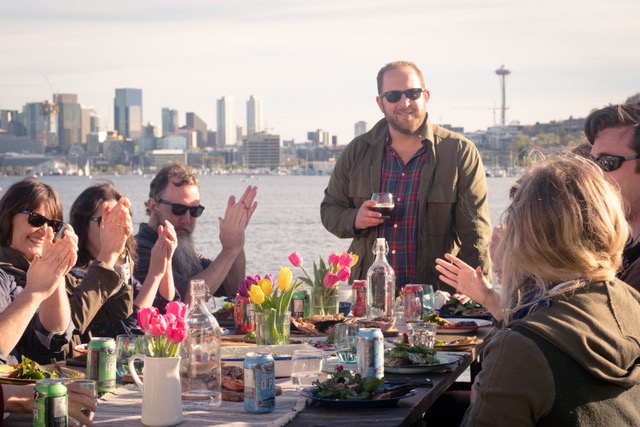
What would you say is the most epic cupboard meal that you’ve ever cooked or prepared?
Joel: Oh my God. I have to think about that… I just think about my bachelor party, which is I decided to ship like 20 buddies out to the middle of this lake in the middle of Upstate New York, Copake Lake. We just rented a house. It was the last day, and it was just garbage leftover. I mean literally just no food. We had no grocery stores within 60 miles. It was a pretty epic feast. To me, that is being scrappy. We made chilaquiles out of stale potato chips. We had all this leftover meat that we made into frittatas I remember. To me, that is the essence of what I’m talking about. I think a lot of people think that being scrappy means that it’s super organic, and you’re on a farm. It’s not that at all. It’s using what you already have and making something beautiful out of it.
Being scrappy is what I did with this garage. I had this garage. It was just sitting here. And now, I turned it into a cooking studio. That, to me, is kind of the essence of what I hope to inspire in people. It’s almost less about the food. Also, with cooking, I did this pizza party one time, and I totally forgot to buy pizza stones, and I had like 40 people coming over for a pizza party. And so I took my Le Creuset pot, and turned it upside down, and used those as my pizza stone. It worked awesome, held the heat. It was great. To me, that’s being scrappy, and that’s just using what you got to make the most of it.
Sure, why not? It’s sort of indicative of what everybody is having to do right now, which is learning those skills. Any stories that you’ve heard or things people have shown you that you’ve been impressed with of people being incredibly resourceful at home in their kitchen during this time?
Joel: Before COVID, I was being tagged and mentioned on social media, I would say, 15 to 20 times a day. Someone would say, “Oh, I cleaned out my cupboard. Thanks, @JoelGamoran,” or, “I found this old stock in the back of my fridge. Thanks, @JoelGamoran. Made a soup.” Now, it’s like over 200 to 300 times a day people are mentioning and kind of want to celebrate them using the most of what they got. I’ve seen everything. You can imagine what I’ve seen. Just crazy concoctions that people made, but they love it, and they’re so proud of it. I think when we all think about our favorite dish, most of the time, it wasn’t something planned. It was like I whipped this together super quick and just on a whim with what I got. It turned out awesome. That’s what I think people are kind of realizing. One person just tagged me. They made banana peel, pulled pork tacos. If you cook banana peel, which is actually really delicious.
Wow. We’ve only heard about people smoking them.
Joel: You can pull it like pulled pork. They put barbecue sauce on it and all this good stuff. They shredded it onto a sandwich with slaw, and all this other stuff. It looked like pulled pork. They’re vegan. Blow away. Blown away. I mean most of what I’ve learned about this is we’re just scratching the surface. I’m only so creative. Then once you get people jazzed about it, it’s like, “Holy crap. They take it, and run with it, and make it even cooler.” That’s been really uplifting.

Yep, save these.
How do you think people’s attitudes about scraps, and waste, and maybe even expiration dates in this country were formed? What sort of factors do you think were most instrumental in forming those attitudes in the first place?
Joel: It’s really interesting you bring that up. I’m speaking a lot about that with people in my world right now. I don’t know. You can start at the industrial revolution, and you can kind of follow it all the way up to today. All of a sudden, when you’re in the ’80s, you see drive-throughs and fast food culture. All that is true, right? Convenience is everything to Americans, everything. It’s why, at the end of COVID, way more people are going to be eating at home than going out to eat because you can have… Way more people are going to start ordering ingredients to be delivered to them, and they’re going to start ordering restaurant food to be delivered to them. Whenever there’s convenience, it thrives in America. I’m guessing that’s the number one reason why we got here.
My grandparents saved everything. There was a time when things were as convenient. You had to wait a week before your chicken guy came back, so if you want the flavor of chicken throughout the week after you ate it, you would have to make your own stock. Now, you can literally go just grab another chicken. Instead, you can even have the chickens delivered to your house. So I don’t know how we got here, but I think we need to take ownership of it and, obviously, move on, and stop wasting billions of dollars on just being convenient, if that makes sense.
Expiration dates are complete BS. You can quote me.
And in terms of expiration dates beyond basic food safety, do you think that those kind of attitudes are going to change or maybe standards on what’s fresh and what’s right maybe? People are certainly testing the limits right now.
Joel: Expiration dates are complete BS. You can quote me. They’re total bullshit. They’re made by the manufacturer of food, which is like that is such disconnect. People don’t realize that, right? An egg company sets the egg expiration date. That’s crazy. They’re basically telling you when to come back to the store and buy more eggs. That’s what they want you to do. I guarantee you you have a carton of milk, and you look at that expiration date, and you smell it, it smells totally fine. You smell it two weeks after that expiration date, it smells totally fine. So why does it say that on the milk carton? It’s because the milk companies want you to come back and buy more.
I am really determined to teach people how to cook with their senses and not necessarily rely on a recipe. That’s really important because you can smell something, see something, feel something, and it will tell you. We have it built into our systems already. It will tell you if it’s not good to eat. If you have any doubt, then throw it away. I always say, “We’re cooking scrappy. We’re not cooking crappy. If something’s crappy, throw it away. Don’t get sick.” But if you have a hunch that it’s totally fine, then it usually is totally fine. So I do think people are going to kind of change.
You’ll know when it’s no good because you’ll smell it.
Joel: Totally. Because you’ll smell it. You’ll use your senses. Absolutely. I think what job has become is how do I empower people with that knowledge. How do I help you trust yourself again, to the point… the same trust that… like a grandparent might pick up that milk and be like, “It’s fine. It’s no problem. Eat it.” It’s like there’s a confidence there that they have that we don’t have, that our generation doesn’t have. And so how do I re-instill that? That’s kind of been my goal.
What’s a basic dish or a staple that all these new stay-at-home chefs should be able to cook? Maybe this is from something that you think almost everybody would have around.
Joel: I think one of the most basic things you can do just to try things out but… I’ll give you two: One is you should use the tops of your carrots like parsley. So wherever you see parsley in a recipe, you should use the tops of carrots. When you cook the tops of carrots, they actually have a really vibrant, kind of bright, beautiful scent to them. Yeah, if you make a pasta, throw some carrot tops in there. You’re making an omelet, throw some carrot tops in there. Stir fry, great. That, to me, is one of the easiest.
I would say another easy one is we all have onions, and we all are left with the onion skins. One of my favorite things to do is just to put those in a pot with a little bit of water, just enough to coat them. Bring it to a boil, and then simmer it for about an hour, and you have an onion stock. That stock to make onion soup or to make even just chicken noodle soup or whatever. It’s really delicious. It’s super healthy for you, and, again, just really robust, and just different, right? It’s different than just a vegetable stock or a chicken stock. This is an onion stock. This is its own thing. Unbelievable for risotto or paella. Incredible for making sauces. Those are two really basic ones that I think people could get behind.





